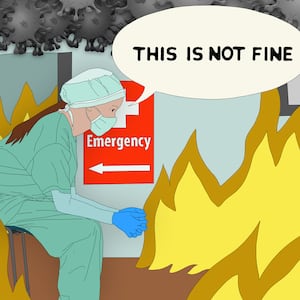Dr. Lorna Breen survived COVID-19, but the pandemic still ended up taking her life. Last spring, Breen—a bright, exceptionally driven 49-year-old who supervised the New York-Presbyterian Allen Hospital emergency department—recovered from the coronavirus, only to be hit with a wave of depression that landed her in a psychiatric ward. In the following days, her brother-in-law Corey Feist told The Daily Beast, she kept articulating one fear: that she would lose her medical license because of her treatment. About a week after being discharged, she died by suicide.
“She was convinced beyond any doubt that she was going to lose her license,” Feist said in an interview this week. “It absolutely was a key contributor in her decision to take her own life, which is tragic in so many ways.”
The pandemic has focused attention on physicians’ mental-health struggles, and the ways in which the medical establishment perpetuates them. Chief among these concerns is the fact that many state medical boards—the agencies tasked with licensing physicians to practice—still require doctors to disclose their mental health history on their applications and renewal forms. Experts say these questions lead doctors to delay treatment, self-medicate, and seek out therapists in other cities to keep their struggles secret. In extreme cases like Breen’s, the stigma can be deadly.
Spurred by these concerns, a group of researchers last year sought to examine just how many state medical boards follow federal guidelines on how to approach mental health on licensing applications. The answer, they found, was exactly one.
Nearly 70 percent of U.S. states and territories continue to ask doctors about their mental health, and 28 percent ask for diagnoses beyond any current impairments, according to the study published last week in the Journal of the American Medical Association. Numerous states require this information to be publicly available to anyone who asks.
By comparison, only 25 percent ask about a history of sexual misconduct.
"I understand the intention of these boards. The idea is you want to protect patients,” said Ariel Brown, a co-author of the study and co-founder of The Emotional PPE Project, a nonprofit that connects healthcare workers with mental health professionals.
“[But] what are we trying to protect our patients from?” she asked. “Who are we defining as being acceptable physicians? And why would we prioritize a diagnosis of anxiety in the distant past over repeated accusations—or even convictions—of sexual misconduct?”
Awareness of physicians’ mental-health struggles may have peaked during the pandemic, but it has been bubbling under the surface for years. America’s doctors suffer from disproportionately high rates of anxiety and depression and have some of the highest suicide rates of any profession. A 2014 study found that 57 percent of medical students experienced moderate to severe symptoms of anxiety after their first year of medical school, and 27 percent experienced symptoms of depression. Another found more than 54 percent of physicians displayed symptoms of burnout. On average, one doctor in the U.S. dies by suicide every day.
Paradoxically, those who work closest to medical treatment are some of the least likely to seek it. One 2018 study found 61 percent of residents and fellows felt they would have benefited from psychiatric treatment, but only 24 percent actually sought it. A survey of 2,000 women physicians conducted that year found that almost 50 percent thought they met the criteria for mental illness but had not sought treatment. Participants in both studies cited fear of affecting their licensure as one of the top reasons they did not seek help.
“We know that physicians have a lot of their identity revolving around their profession,” said Dr. Katherine Gold, who conducted the survey of the woman physicians. “And whenever you talk about something which is potentially [jeopardizing] someone’s ability to be a physician and practice as a physician, it’s really threatening.”
Asking questions about mental health on licensing applications, she added, “is incredibly threatening to people, and it trickles down to people simply deciding they’re not going to reach out and get help.”
By 2015, major groups like the American Psychological Association had started to recognize the harm in these questions and recommend against their use. The American Medical Association approved a resolution in 2016 asking licensing boards not to require applicants’ full mental-health histories. The Federation of State Medical Boards released its own guidance in 2018, urging states to consider whether it is necessary to include “probing questions” about mental health and noting that a history of mental illness “does not reliably predict future risk to the public.”
“Physicians should feel safe about reporting burnout and be able to take appropriate measures to address it without fear of having their licensure status placed in jeopardy,” the group wrote.
For those states that did want to ask about mental health, the Federation of State Medical Boards made several suggestions: First, that they ask only about conditions that currently affected the physician’s work—a well-managed diagnosis of anxiety, for example, would not qualify—and that they limit the scope of such questions to the previous two years. (“The idea is that if you want to know if someone is going to be a good physician, ask them about their ability to be a good physician. Don’t ask them about their history,” Brown said.) The group also recommended that boards include a statement on the importance of seeking help for mental-health issues on their applications, and allow for those currently in treatment for their illness not to report it.
Over the course of the pandemic, Jessi Gold, a psychiatry professor at Washington University in St Louis School of Medicine, saw a growing number of health-care workers in her clinical practice. Unsurprisingly, many of them were nervous about disclosing their treatment to their state medical board. Knowing that a 2017 study had found that less than half of all states limited their applications to questions about current impairments, Gold found herself wondering whether anything had changed, and if there was any good news she could give her patients.
So together with five other researchers, Gold reviewed the licensing applications in 54 U.S. states and territories. “There was some hope that we could go back and do a deeper dive to show that medical boards had made some progress, and help physicians see that not every state was horrible,” she said.
The results were mixed. As of the end of the study, 15 states continued to ask questions about any past diagnoses, regardless of current impairment, or asked applicants to hypothesize about any potential future impairment. Oklahoma, for example, asks about any conditions that “if untreated, could affect your ability to practice competently,” while North Dakota asked about conditions that “could be said” to impair a physician’s ability to practice. (A representative for the North Dakota board of medicine said it updated its questions last year to remove the hypothetical; the executive director of the Oklahoma board said they were “in the process of making some changes.”)
Some states even asked references to weigh in on this point, asking them if they knew of any “emotional disturbance” that could impair their colleague’s ability to practice. (Wyoming, for example, asks references if the applicant has “ever shown signs of any behavioral, drug or alcohol problems.” The executive director said the group was reviewing such questions.) Forty-one states limited their questions to the last two years of an applicant’s life, but less than half allowed those in treatment not to report it, and only eight included supportive language. Five states failed to meet any of the recommendations.
What the medical boards do with the information is not entirely clear. A 2007 survey of 35 state medical boards found that 13 of them could sanction applications on the basis of a mental health diagnosis alone. Fourteen said the same about a diagnosis of a substance abuse disorder. And nearly every board said they could revoke, suspend, restrict, or otherwise limit the license of a physician they deemed “mentally impaired.” Katherine Gold recalled a colleague who applied for licensure in Florida, only to be called to testify before the medical board about her brief experience with postpartum depression. “It was very traumatizing for her,” Gold said.
The effects of this are apparent. Forty-four percent of the women in Gold’s 2018 study who did not seek treatment for a mental-health issue cited a fear of reporting it to a medical board or hospital as a deciding factor. Of those who did go for help, 35 percent did so in a different city or health system, and 18 percent admitted to writing their own prescription or asking a colleague to do so. One respondent said they were afraid to even take an antidepressant for fear it would wind up on their record. Another said she quit residency rather than seek care.
“I have known many colleagues to date who have not sought help when needed due to concerns about retaliation against their licensure, credentialing, reputation, etc,” one respondent wrote. “In at least one case [it] contributed to suicide.”
The most recent study did show a positive change, with several more states limiting their questions about mental health or removing them altogether. But the problem, Brown said, is many physicians are not aware of that fact, and have no way to find out. Forty percent of the applications surveyed for her study were not publicly available, and at least nine states had changed their policies between when the study started in July and when it ended in February.
“The target is moving and the target is obscure, and there is just no clarity from on the ground,” Brown said. “There's just so much fear and stigma that the assumption is, ‘If I seek treatment I will have my license taken away.’”
That was the same assumption Breen made when she decided to end her life, Feist said. She was so entangled in the stigma of mental-health treatment, he said, that she did not realize New York is one of the few states that does not ask questions about it in license renewals. “She clearly articulated to us that she was going to lose her license and lose her job,” he said. “And what was so tragic in retrospect… was that Lorna was wrong.”
As part of his work with the Dr. Lorna Breen Heroes Foundation, Feist said he is advocating for a “major national awareness campaign” about current state licensure law.
“If Lorna had known her state law and trusted it,” he said, “maybe she would have thought differently.”








